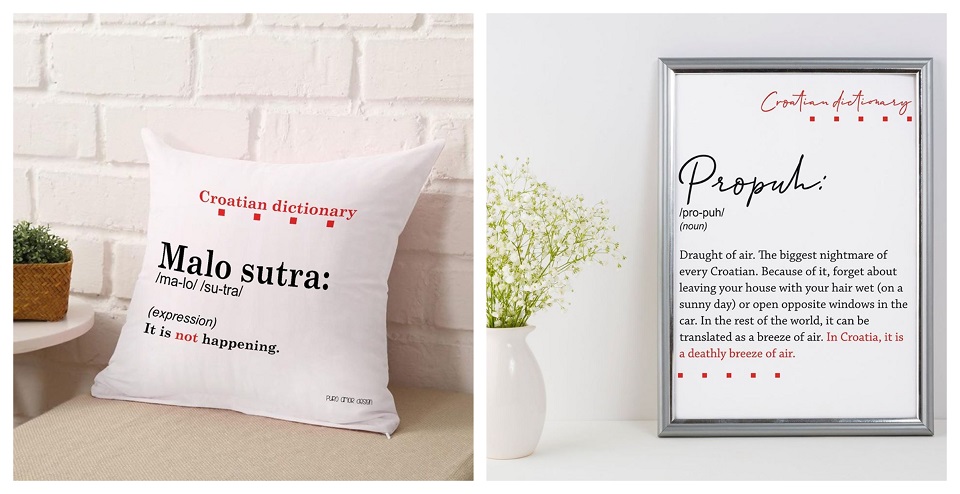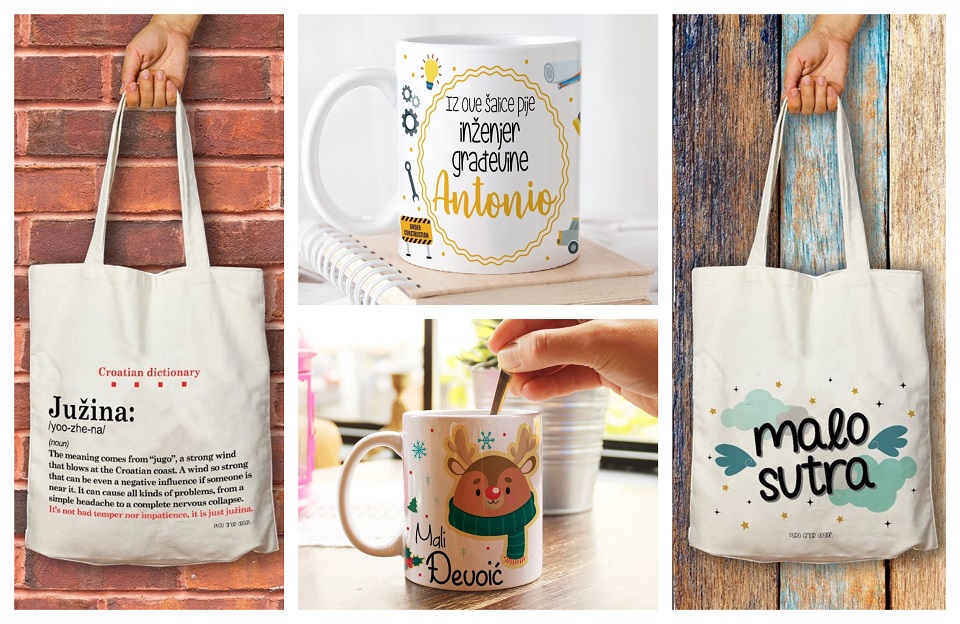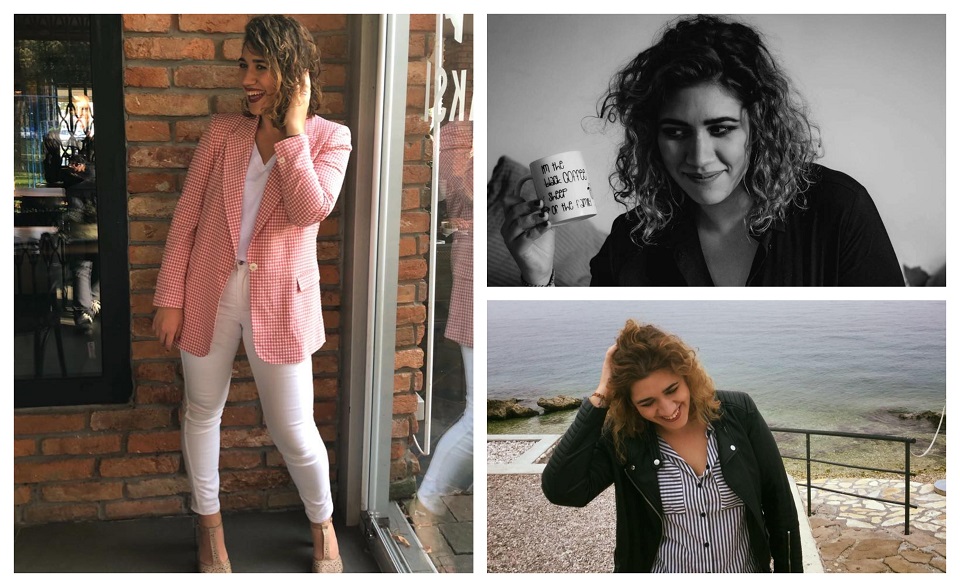Croatian Peruvian Returns to Homeland Starts Design Business
Dragitza is a brilliant young Croatian Peruvian who decided to seek a better life in her homeland. She started her own business, has a stand-up comedy act and is a finalist on a popular TV cooking show.
Founder of Puro Amor Design in Zagreb
You may not have heard of Dragitza Rastegorac yet, but you have probably heard of the brand Puro Amor Design, which has been selling cups with wacky and personalized labels for a while. This 29-year-old was born and raised in Peru, but her Croatian roots brought her back to the region her family came from. She recently spoke to Veronika Švob/SUPER1/Telegram about life in Zagreb, her first job, stand-up comedy and her current business over coffee at Cogito Café on Deželićeva Ulica.
Dragitza was born and spent 26 years of her life in Lima, the capital of Peru. Her father is originally from Kupres and her mother is from Bugojno, so when she turned nine, she had the opportunity to spend two years in Croatia before returning to Peru again. After graduating from high school and college in Lima, Dragitza decided that she no longer wanted to live Peru and decided to come to Croatia.

Puro Amor Design | Facebook
Left Corruption and Poverty in Peru for Better Croatian Life
"After graduation, I didn't even look for a job there, but came to Zagreb. The people of Lima most often go to Argentina to look for work or further education, but I did not want to go that route. Something drew me to Croatia.”
She claims that it was not because of the people and adds that the Peruvians are very warm and know how to socialize with others, but Lima is a very unsafe place to live.
"There is so much poverty, and corruption which does not benefit people at all, and I simply felt that I did not belong there. While I was growing up, we often spent time in Croatian emigrant social circles. Most of those Croats had arrived in Peru after the Second World War and were already third generation. I am second generation, for example.”
“I studied communication science, and the course of study is quite different than that in Croatia. I learned a lot about advertising and graphic design. After I completed my degree, I applied for a scholarship in Croatia, which was not difficult to get, because there are plenty of openings. I think the goal is to encourage Croatians to eventually return from abroad. Not all of them stay, of course, and some only come for a year or two.”
She first came alone, lived in a dormitory on the Sava, and met a lot of people from Peru, Argentina and Canada at that time.
Studied Croatian As Scholarship Student in Croaticum
“I studied Croatian through the Croaticum program at the Filozofski Fakultet (Faculty of Philosophy) and it was quite challenging, but I believe it is currently the best program for learning Croatian. It was not my first contact with the Croatian language because I came here at the age of nine and went to school here for two years.”
She spoke Spanish all her life, but what she had learned as a child helped her a lot. "The Croatian language is very difficult, it is really demanding, especially when it comes to the cases. I can't compare it to Spanish at all.”
She speaks Croatian very well today, adding that she still messes up the cases sometimes. After her classes ended, she stayed in Croatia for another month before returning to Lima. But then she came back to after half a year and knew then that she wanted to stay Croatia. "I had a great roommate from Slavonski Brod and met a lot of foreigners, somehow it all fell into place."
First Job as Manager at Museum of Illusions
"My first job in Zagreb was at the Museum of Illusions. I saw an ad saying that they were looking for someone who spoke English and that Spanish was an advantage. I applied for this job thinking that I would be the guide in the museum, not run the whole museum. However, it turned out that I became manager of the museum and stayed there for about a year.”
She points out that it was no problem for her to get the job, and that she rejected as many as two offers in the meantime.
"Many thought I got the job through a relationship, but I really didn't. After a year at the museum I was working on another project for them, but it didn't work out very well and I was glad when I got fired. Everyone around me was amazed to see that I kept a smile on my face, but I just had to.”
She had her own business plan in mind by then, or rather she had just begun thinking about it, but hadn’t done anything yet.

Puro Amor Design | Facebook
Created Business Plan Out of Love for Collecting Cups
She first came up with the idea of making cups because she collected them. “I was constantly searching for cups with Croatian inscriptions and could not find them anywhere. Now there are several cups, but at that time I couldn't find anything interesting.” It occurred to her to start making them herself, so she began with drawings, and was somewhat inspired by the Spanish brand Mr. Wonderful, which does similar work in all languages. "So, I started and showed my friend some ideas and she really liked them.
"My dad lent me money to print the first 250 pieces, I opened a Paušalni obrt (or lump sum business – I still don't know exactly what that means, but I am a lump sum) and started the business.”
After she reached out to the Instagram profile @zagrebfacts as it offered her a lot of Zagreb slang expressions; people started inquiring. "That was two years ago, I remember that I had sold almost a hundred pieces in just a few days. That early success fueled my motivation to continue. "
After that, she bought her first printer, then a second and third. She started her business in a room in a rented apartment and eventually moved it into the living room. "My emphasis is on personalized mugs, and I offer customers five options to choose from. Then Mother's Day came, and the business simply swelled to such an extent that shops started contacting me with their orders.” Then the media became interested and there were competitions. She even tried to work with Croatian influencers, but that did not progress. However, she had the great fortune of opening a showroom in on Jurišićeva Ulica.
Opened Puro Amor Design Shop on Jurišićeva Ulica
"I am here alone most of the time. My best friend helps me, and everything goes from production to sale here." Although she started with cups, she began producing canvas bags and feathers last February, and next February she expects to continue with t-shirts and hooded sweatshirts. Now she is making a decent living. "I do not expect to make a fortune, but I think something like this was needed in Croatia. At least that’s how it turned out for now.” You can follow Puro Amor Design on Facebook and Instagram.
Moonlighting as Stand-Up Comedienne at Studio Smijeha
She also took acting classes in Peru and was part of an acting ensemble, Dragitza has a few plays behind her. "This is one of the reasons why I wanted to go to America after college. I even auditioned for the New York Conservatory for Dramatic Arts, which is quite demanding but too expensive, so I gave up. It was a good confirmation to me that I have talent, so when I came to Zagreb, I enrolled in Studio Kubus, but realized that it was quite difficult for me to act in Croatian.”
Shortly after, she found a stand-up workshop at Studio smijeha (Studio of Laughs) and decided to go there.
"Marina Orsag told me that I was very endearing, that I had a super accent, and advised me to write some text. She soon asked me when I was planning on performing on open mic, and although I was excited, I didn't tell anyone I was going to do it. The show turned out great, and the crowd was roaring with laughter. The topics revolved around my parents, life in Zagreb, about being told that I’d never find a job here, and about some of my observations as a foreigner."
She also draws his inspiration from her love life, which she says is totally chaotic. "Well, I borrow stories from girlfriends, funny down-to-earth stories but I'm pretty focused on women's topics. From PMS to the gynecologist.” She doesn't write as often as she would like but hopes to hold a new performance every month. "A lot of people come to listen to stand-up, it's brilliant to realize that you can make people laugh. I'm an optimistic person and see good things in everyone. I'm a positive person by nature."
In her free time, she goes to Praćka for karaoke, while she chooses Katran for dancing. "Well, that was a bit of a shock to me. In Peru, you dance wherever you go but there’s nothing here. It's so hard to get people to move around here. And at first, I went to Latin American dance events, because I missed them so much.”

Dragitza Rastegorac | Facebook
Made it to Semi Finals on Popular Cooking TV Show
She loves to cook, mostly Peruvian cuisine, and her mom sends her spices regularly to make those dishes work. "We eat very spicy foods, and prepare meat for a long time, and coriander and yellow chili are my favorite spices." She admits he does not excel in preparing fish. In Peru, raw fish, known as ceviche, is one of the most famous dishes. "From Croatian cuisine, I love pate, beans and greens and Istrian specialties which my roommate’s mom sends." Dragitza also recently made it to the semi-finals on the TV show Kuhan i pečen (Cooked and Baked).
"She likes the pace of life here. Zagreb is not that big of a city and I can get everything done in one day. The only sad thing for me is that Croatians want to leave the country and they often tell me that I won’t stay here for very long. I don't think they appreciate what they have, but I don't know. And it wasn't that easy for me to start this adventure. There were days when I only sold one or two cups, but if you are persistent and if you work hard, there is no door that won’t open. Croatians do not consider the option of starting their own business after graduation, while that is common practice in Peru. If you don't find a job, you can figure out one out for yourself. I have a dozen more ideas, but don't have time for everything.”
Well, Dragitza is a good example of commitment all the way to the finish line, and nothing can stop her. She's truly inspirational.
Follow our Made in Croatia page and Diaspora page to keep updated on Croatia returnees, their business ventures and successes.
Owner of Korčula Boutique Hotel: ''I Came Home and Fulfilled My Dreams''
As Novac/Dora Lozica writes on the 25th of August, 2019, Novac met Zlatko Fabris, 41, at his hotel on Korčula, engrossed in figures and tables. He received the journalists cordially, though limping, telling them that he had injured his leg when splitting firewood, he had to undergo surgery, but that there's no time for that now!
When the season starts, there's no time for health either, Zlatko says, only work! The times of hotel owners simply sitting back and watching as hotel and restaurant workers do the hard work have passed.
With this philosophy, Zlatko came from South Africa to beautiful Korčula exactly fifteen years ago. Born in South Africa, Zlatko has always dreamed of one day returning to his roots, his old Korčula surname, Fabris, called him back to the Dalmatian island. However, it was not easy to decide to come to Croatia without knowing the language and the everyday ways of life, Fabris revealed.
His family is engaged in construction and tourism, but South Africa's dark history of the coexistence of blacks and whites was turbulent, to say the very least.
''Back there, people will put a gun to your head there for money,'' Zlatko admits, so he decided to come to Korčula, hoping to find his peace there and a place where life is worth more than just money. And he wasn't mistaken. First, he tried his best to learn the Croatian language, because how can someone named Zlatko not speak Croatian!? It's simply impossible! And then he got to grips with what's best for him - his business, writes Slobodna Dalmacija.
With his initial capital, he bought a house on Plokata, the main town square in the very centre of Korčula. He bought the house from the City of Korčula itself, who then bought the birth house of Marco Polo with that money. The house soon became the famous "Happy House" hostel, with dozens of backpackers staying overnight. There was always a loud and cheerful atmosphere at "Happy House", Zlatko admits they had a good time with alcohol, song and laughter, but that it annoyed the people who lived nearby.
''They were absolutely right and I understood them one hundred percent, I started thinking how I could change the concept. I have to say, hats off to the team from the Lešić Dimitri Hotel and the Korsal Hotel, they were the first to start the story of the boutique hotel, they had the courage to do it first.
When one begins, the other is encouraged, and in 2015 one of them was me. The Fabris opened its doors,'' Zlatko says, referring to his four-star boutique hotel, which is not really a hotel because it has no elevator. Namely, in order to register his facility as a hotel, he has to have an elevator for four floors, and circumstances don't allow him to install an elevator, so he calls his facility simply "The Fabris''.
But "The Fabris" is, after all, a small "boutique" four-star hotel.
Increasingly, the term "boutique" hotel can be heard in Croatia as an ideal destination for those who, in addition to their holidays, want to experience and know more about the destination they're visiting.
"Boutique" or "lifestyle" hotels are a new trend of tourist offer, only a few decades or so old. They are smaller in capacity, but are designed in a luxury and indigenous style, relying on the values, culture and customs of the area in which they are located.
This was exactly the concept that Zlatko used to manage the interior of his building in Korčula, so he could leave everything in its original form when it was renovated. The interior walls, as well as the exterior ones, are made of antique stone, and the stairs, floors, beds and openings are made of solid oak. In all the bathrooms, there is a combination of stone and glass, the floors are adorned with expensive carpets that Zlatko brought from different parts of the world, while on the walls are old photographs of the Fabris family, which tell the visual stories of formerly world-renowned Korčula shipbuilders, including Zlatko's great-grandfather.
"The Fabris" is an attractive yet relaxed blend of tradition and a modern, minimalist approach. Zlatko didn't make the mistake of taking his initial success for granted, and last year, he decided to make another investment. About ten metres from the hotel, he bought another abandoned ruin in the heart of Korčula.
With an investment of one million euros and a lot of hard and dedicated work, that ruin has been transformed into "The Fabris 2" this season, with eleven luxurious rooms decorated in the same tone as the first hotel. The capacity of "The Fabris" is currently 21 rooms, with a rating of 9.4 on booking.com. His guests are delighted, they don't want an industrial environment, but the ability to enjoy Korčula's history, architecture and authentic culture. Most of Zlatko's guests are English-speaking, as many as 80 percent of them.
Zlatko does not take all the credit for his success.
''In the season, I employ 11 people for 6 months, half of them for longer than that. They do a fantastic job and it's important to me that they have good salaries. Money motivates people and if you want loyalty and quality, you have to pay. In addition, I want people on the island to live well all 12 months of the year, I wish that every year I could travel somewhere to get to know other countries and cultures so that they would be good hosts themselves. Yes, the season has been 30 percent weaker, but that's temporary, next year, it will be even worse, So, 2015 or 2016 will happen again. You just have to always do your best,'' Fabris explained.
''I believe in Croatia and our future. We're not just any old country or any old city, we have centuries of culture and history and this is our strongest asset. We quarrel with each other, but when there is a serious problem, we are one. I think the workers from the hospitality sector from the island need to meet once a month, we have to have a common plan and strategy, stick together and help one another. From the first day, the Korčula locals have accepted me just as I am, and I'm grateful to be able to live and work here,'' Zlatko concluded.
Make sure to follow our dedicated travel, lifestyle and Croatian diaspora pages for much more.

